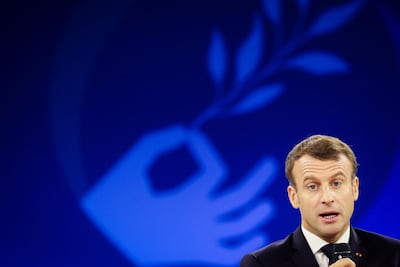It is now 40 years since US president Jimmy Carter made his "crisis of confidence" speech to the American people, at a time when the US of 1979 was facing multiple threats.
The 20-year Vietnam War had ended in American humiliation in the mid-1970s and the Watergate scandal had both propelled Mr Carter to power in 1976 and significantly weakened the American people's trust in its politicians.
It was against this backdrop and the collective challenges of an energy crisis, rising inflation and shrinking opportunity that Mr Carter addressed the nation in 1979.
While much of the speech was given over to the specifics of his proposed energy plan, its preamble has an interesting resonance in both the US and Europe today.
He described America as having been struck by a "crisis of confidence" that threatened to destroy the social and political fabric of the country. For those unfamiliar with his words, the highlights are worth replaying.
“We can see this crisis in the growing doubt about the meaning of our own lives.
“The gap between our citizens and our government has never been so wide. The people are looking for honest answers…clear leadership, not false claims and evasiveness.
“What you see too often in Washington...is a system of government that seems incapable of action.
“You see a Congress twisted and pulled in every direction by hundreds of well-financed and powerful special interests. You see every extreme position defended to the last vote, almost to the last breath by one unyielding group or another.”
It’s not hard to imagine those same sentences being used today. The crisis of confidence in US politics and, indeed, in western democracies in general is writ large.
The drift that Mr Carter identified in the 1970s is all too evident in America and, indeed, the broader West today. Tribalism and extremism have too often replaced consensus and calculus.
Some of this has been driven by the harum-scarum nature of the Donald Trump years in the White House, some of it by the modern-day preference among almost all of us to only listen to the voice inside an echo chamber.
But this is not a critique of the Trump years, more an observance of the historical parallels between the US of 40 years ago and the one of today.
Just as in the early 1970s, the talk of impeachment has hit fever pitch. Just as then, America finds itself questioning its place in the world. The paralysis of politics that was evident then is clear today. Support for mainstream political parties is declining, with millennials almost as likely to identify themselves as independents as they are to register as Democrats or Republicans.
A similar shift in trust and support for traditional political parties and even process itself is evident in Europe. Few expect the UK election next month to be fought along conventional party lines. But the problem is much deeper and wider than political affiliations, prompting French President Emmanuel Macron to tell The Economist this month that "strategically and politically we need to recognise we have a problem".
While describing post-Second World War Europe as a peaceful “miracle”, Mr Macron also maintains that the continent has lost its bearings, a situation that is compounded by Mr Trump’s America, while still a “major ally”, not sharing “our idea of the European project”. A further complication, he says, is that Europe itself is suffering from an “economic, social, moral and political crisis” spurred by “selfish nationalism”.
Europe, he concludes, needs to “wake up, face up to this situation and decide to do something about it.”
Mr Macron's comments have been described by Francois Heisbourg as those of a "policy detached think tanker". The former French official also called Mr Macron's views "bizarre and dangerous". But to some degree this is his "crisis of confidence" moment. A recognition, like Mr Carter four decades ago, of a crossroads being reached and of the need for a change of course.
Mr Macron sees Europe on “the edge of a precipice” today, which is a description that would not have looked out of place in Mr Carter’s speech about the US 40 years ago.
The history of the Carter years provides no guide as to what is likely to happen next. Within days of that 1979 speech the US president had purged his Cabinet, an act that was seen as a sign of a government in turmoil rather than as an indication of a new beginning. Within 18 months he was out of office, beaten by the relentless "Let's Make America Great Again" campaign waged by Ronald Reagan and by an energy problem at home and the Iran hostage crisis abroad.
Mr Carter, who was admitted to hospital earlier this week in Atlanta for a procedure to relieve pressure from his brain, has spent his post-White House years "waging peace, fighting disease and building hope" and won the Nobel Peace Prize in 2002. I suspect he would tell any of today's statesmen and women that identifying a problem is one thing, but finding the right solution is quite another.
Nick March is an assistant editor-in-chief for The National



